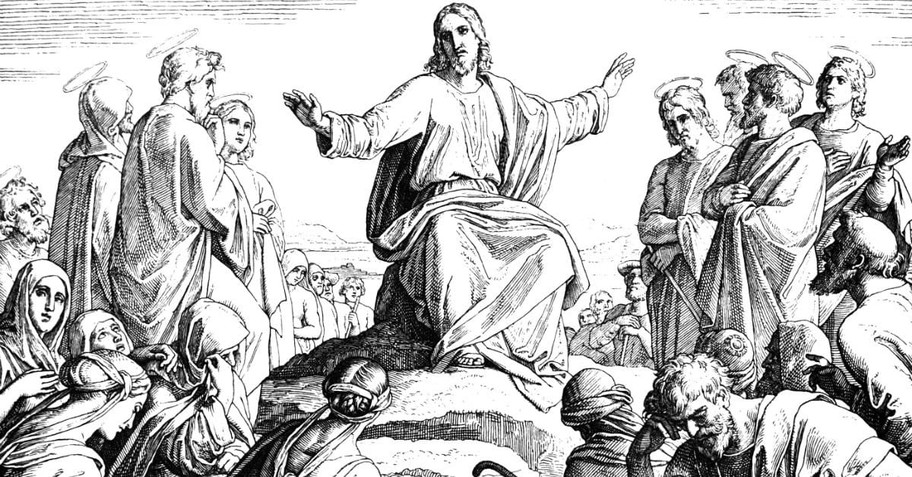Type the question “Who is Jesus?” into your computer search bar, and you’ll find 622,000,000 results. That’s well over half a billion answers!
Christians know there is so much more to Jesus than what’s found on the Internet, but how do we explain Jesus in a way that is simple enough to be clear, yet scripturally rich enough to be compelling?
Here are ten suggestions for explaining who Jesus is to a non-believer. The first five suggestions discuss how to share Jesus; the last five discuss what to share about Jesus.
Photo Credit: Unsplash/KellySikkema
How to Explain Jesus to a Non-Believer
1. Pray for Wisdom
It’s been said, “Before you talk to people about God, talk to God about people.” That’s sound advice. The Holy Spirit gives us insight about what to share with unbelievers, and how to share it. The Holy Spirit also illuminates the mind of unbelievers so they are able to grasp the reality of Christ.
Even if your prayer is a silent plea for God to give you the right words, ask for His help. Pray for wisdom.
2. Know Your Audience
Explaining who Jesus is is not a “one size fits all” proposition. Some non-believers are familiar with the basic facts about Jesus, while other non-believers know virtually nothing. What we share about Jesus will depend on whom we are talking with and the accuracy of what they already know.
Recently, I asked my hairdresser about her spiritual background. During the course of our conversation I asked how much she knows about Jesus. She laughed before admitting, “not much.”
When we aren’t sure how to explain Jesus, a simple question like, “Did you grow up with any religious background? I’d love to hear about it” is a great way to start.
3. Listen at Least as Much as You Talk
When we share Jesus, it’s easy to do all the talking. For some, nerves drive us to jabber on, rather than allow silence that is sometimes necessary to process information about Jesus.
Others are excited to share Jesus, and enthusiasm about the conversation can cause us to dominate the conversation. Some lack the social awareness necessary to grasp that explaining who Jesus is is best received when shared as a dialogue rather than a monologue.
For all of us, listening is as important as talking. After all, how will we discern what to share about Jesus unless we listen as least as much as we talk?
Photo credit: Thinkstock

4. Keep Jesus the Main Thing
Conversations about Jesus can easily morph into controversies about peripheral issues. Debates on creation versus evolution, questions like, “How can a good God allow evil and suffering?” and political, moral, and ethical issues do have their place.
But these issues usually move conversation away from Jesus rather than toward Jesus. If the goal is to explain Jesus, then talk about Jesus—and leave peripheral issues for later discussion.
5. Share How Jesus’ Identity Meets Needs
A quick call to my son, who is a pastor of young adults (and is himself a young adult), unearthed a helpful tip for explaining who Jesus is to the younger generation (and, I suspect, all generations).
We can help non-believers more readily understand Jesus if we explain Jesus not only in language they understand, but also in terms of their needs.
For instance, if a non-believer struggles with guilt and shame, explaining how Jesus forgives and loves might illuminate the gospel better than explaining how Jesus is the Creator (for example).
It takes a lifetime to fully understand who Jesus is. Grasping all of Christ’s glory and greatness won’t happen in one conversation. But we can help non-believers begin to understand who Jesus is when we explain Jesus in ways that makes them say, “Yes, I get that, I’ve felt that, I understand that.”
Photo credit: Thinkstock/mbolina

What to Share about Jesus to a Non-Believer
6. Jesus: The World Changer
When explaining Jesus to a non-believer, it’s often helpful to start with commonly accepted facts about Jesus. Even the simple realities that surround His birth, life, and death, indicate that Jesus was no ordinary person.
Jesus was born in an obscure village to working class Jewish parents, more than 2,000 years ago. A carpenter by trade, Jesus began his public ministry at the age of 30 and was crucified a mere three years later.
That’s 36 months to spread His message. Only 1,095 days to transform His generation, and every generation to come.
With only three years of ministry, no access to technology, social media, or even the printing press—Jesus changed the world.
Photo credit: Thinkstock

7. Jesus: Fully God and Fully Man
The Bible makes it clear that Jesus is more than a prophet, a good teacher, or the founder of Christianity.
Jesus is God in the flesh.
Jesus pointedly asked his disciples, “Who do people say the Son of Man is?” They replied, “Some say John the Baptist; others say Elijah; and still others, Jeremiah or one of the prophets.” “But what about you?” he asked. “Who do you say I am?” Simon Peter answered, “You are the Messiah, the Son of the living God” (Matthew 16:13-16).
Importantly, Jesus affirmed Peter’s answer.
Here is a sampling of what the Bible says about Jesus’ identity:
The Son is the image of the invisible God, the firstborn over all creation. For in him all things were created: things in heaven and on earth, visible and invisible, whether thrones or powers or rulers or authorities; all things have been created through him and for him (Colossians 1:15-16).
For God was pleased to have all his fullness dwell in him (Colossians 1:19).
In Christ all the fullness of deity lives in bodily form (Colossians 2:9).
The Son is the radiance of God’s glory and the exact representation of his being (Hebrews 1:3).
“The virgin will conceive and give birth to a son, and they will call him Immanuel” (which means ‘God with us’) (Matthew 1:23).
Philip said, “Lord, show us the Father and that will be enough for us.”Jesus answered: “Don’t you know me, Philip, even after I have been among you such a long time? Anyone who has seen me has seen the Father (John 14:8-9).
Jesus was more than a man; more than the founder of Christianity, more than a prophet, more than a teacher, more than a moral example. Jesus is fully God and fully man.
Jesus is God with skin on.
Photo credit: Thinkstock

8. Jesus the Savior
Before Jesus was born, an angel appeared to Joseph with these words:
“Joseph, son of David, do not be afraid to embrace Mary as your wife, for the One conceived in her is from the Holy Spirit. She will give birth to a Son, and you are to give Him the name Jesus, because He will save His people from their sins” (Matthew 1:20-21).
A Savior requires at least two parties: one (or more) people who need to be saved and one person who saves. But what, exactly, do people need to be saved from? And how did Jesus save us?
Scriptures teaches that all people fall short of God’s holy perfection. Romans 3:23 puts it this way: “For all have sinned and fall short of the glory of God.” There’s a reason the phrase “nobody’s perfect” has been repeated for decades; everyone knows it’s true! This also explains why the church is filled with hypocrites. Every person falls short of God’s holy perfection—even religious people.
Our sin created a debt we owe to God, and our sin created a gap we experience with God.
Jesus died in our place for our sins, cancelling the debt every one of us owes to God. But his death did something else, too—it saved us from separation with God now, and also in the life to come.
Put simply: we needed saving from our sin, and because Jesus paid for our sin through His death and resurrection, He is the Savior.
Photo credit: Unsplash/Walter Chávez

9. Jesus: The Prophesied Messiah
The birth, life, death and resurrection of Jesus Christ (“Christ” means Messiah) fulfilled over 300 prophecies written about the Messiah in the Hebrew Scriptures. Here are just five of the prophecies Jesus fulfilled:
1. The Messiah would be born in Bethlehem (Micah 5:2)
2. The Messiah would be born of a virgin (Isaiah 7:14)
3. The Messiah would be resurrected (Psalm 16:8-11)
4. The Messiah would be pierced for our transgressions (Isaiah 53:5)
5. The Messiah would be the descendant of Abraham through whom all nations would be blessed (Genesis 12:3)
10. Jesus: The Resurrected Lord
“For what I received I passed on to you as of first importance: that Christ died for our sins according to the Scriptures, that he was buried, that he was raised on the third day according to the Scriptures, and that he appeared to Cephas,and then to the Twelve. After that, he appeared to more than five hundred of the brothers and sisters at the same time...” (1 Corinthians 15:3-6).
On numerous occasions Jesus predicted his death and his resurrection. Each of the four gospels includes extensive details about the resurrection. All of the sermons in the book of Acts focus on the resurrection. The essential message of the gospel is Christ’s death and resurrection.
There is just one question that should determine if someone should be a Christian:
Is Christianity true?
“For if Christ has not been raised, our preaching is useless and so is your faith” (1 Corinthians 15:14).
But if Jesus was raised, the only logical response is to humbly acknowledge Him as Lord.
Who is Jesus? And how do we explain Jesus to our non-believing friends and family, co-workers and acquaintances? We explain Jesus in the same way we accept Jesus: with humility and love, with grace and truth.
Photo credit: ©Pixabay/Angeleses

Originally published November 15, 2019.







